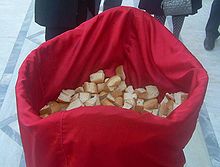Antidoron
 |
|
| Type | Bread |
|---|---|
| Main ingredients | Remains of the loaves of prosphora |
The antidoron (Greek: Ἀντίδωρον, Antídōron) is ordinary leavened bread which is blessed but not consecrated and distributed in Eastern Orthodox Churches and less often in Eastern Catholic Churches that use the Byzantine Rite. It comes from the remains of the loaves of bread (prosphora) from which portions are cut for consecration as the Eucharist during the Divine Liturgy. The word Ἀντίδωρον means "instead of gifts".
In the Orthodox Church, blessed antidoron is distributed after every Divine Liturgy. During the Prothesis (Liturgy of Preparation, at which the wine and bread are prepared on the Table of Oblation), the priest will bless each prosphoron as he takes it up to remove particles and place them on the diskos (paten). The remainder of the prosphora is cut into fragments and kept aside in a bowl or salver. In some jurisdictions it is the custom at the end of the Anaphora for the altar server to hand the bowl of antidoron to the priest who will make the Sign of the Cross with it over the chalice and diskos during the hymn, It is Truly Meet.
Since the Eucharist is essentially a meal, in the Russian Orthodox tradition some of the antidoron is placed on a tray together with ordinary wine and is consumed by the communicants immediately after they receive Holy Communion.
...
Wikipedia
